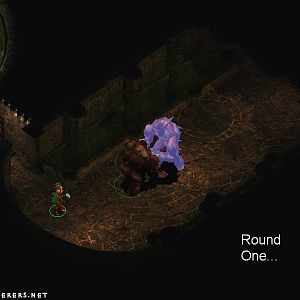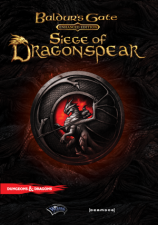-

- Forums
- Chatrooms
- Gallery
- Gameplay Videos
- Upload
- Articles
- Mod Reviews
- Shop SP: Games, Movies, Books

|
Author
Profile: Carrie Bebris (Conducted by WoTC)
|
Carrie talks
about what influences her writing and writing in general. She shares with
us how she has been working on a novel tie-in to the upcoming Pool of
Radiance: Ruins of Myth Drannor computer game and reveals some of the
challenges she had while working on the novel version of Pool of Radiance:
Ruins of Myth Drannor.
Wizards of the Coast: How did you get your start as an author?
Carrie Bebris: I've been writing since I was a child, so I can't say my career "started" at any given moment because I've been developing as a writer my whole life. Along the way, I earned a B.A. in journalism and an M.A. in English literature, worked as a newspaper reporter, taught writing on the college level, wrote freelance magazine articles, edited everything from resumes to marketing materials . . . All this may not sound like preparation to write fiction, but it was, because all writing is related. You learn a lot about diction and tight sentence construction when you're limited to a short word count; you learn a lot about what constitutes good writing when you have to explain to students how to improve theirs. Meanwhile, I wrote fiction in my spare time. My break into fantasy publishing came when TSR hired me as a game editor. Working in that creative environment every day, surrounded by imaginative people, was a wonderful experience. Eventually the opportunity came along to collaborate with Bill Connors on Shadowborn. That novel was my first published work of fiction.
Wizards: What are the main influences on you as a writer?
Carrie: Everything. Every experience I've had in my life -- people I've met, places I've visited, challenges I've overcome -- made me the person I am today. Had I written Pool of Radiance five years ago, it would not be the same book. Five years from now I will be a different person, writing different books.
Wizards: What is the first book you remember reading as a child?
Carrie: That's kind of like asking me to remember when I started breathing. I was reading by age 4, and I consumed books voraciously -- in addition to books we had in the house, we made regular trips to the library. No early titles stand out, no one beloved picture book that fell to pieces. I was always drawn to children's fantasy, though, and as I got older I loved the worlds of Neverland, Oz, and Narnia. I also read a lot of mythology, historical fiction (Wilder's Little House books, L.M. Montgomery's Anne series), and biographies of famous women like Amelia Earhart and Helen Keller.
Wizards: Who are your favorite authors now?
Carrie: This is where you expect me to rattle off a list of fantasy authors, and I shock everyone by saying Jane Austen, Shakespeare, and Mark Twain. I read widely -- fantasy, mystery, romance, historical, mainstream, "literary" fiction, classics, nonfiction. I hesitate to name specific contemporary writers because even authors I admire deliver a disappointing book now and then, or at least one that disappoints me. I find it increasingly hard to enjoy a novel because while one part of my brain is reading the story, the other can't help but analyze the book's structure, dialogue, characterization, style, and so on. My development as a fiction writer has made me a much more demanding reader. When I do actually lose myself in a story, it's a real treat.
Wizards: What do you do to get the creative process flowing?
Carrie: I try to write every day. Especially when I'm working on bigger projects, such as a novel, I find that the longer I'm away from it, the harder it is to get back into the world of the story. If I keep up a faithful pace, it's easier to pick up where I left off as soon as I sit down to write.
Wizards: Pool of Radiance: Ruins of Myth Drannor is a novelization of a computer game. What unique challenges did you face because of this?
Carrie: The biggest challenge was simultaneous creation -- writing the book while the computer game story was still in development. I wound up doing substantial rewriting because changes were made to the game story after I'd already written the corresponding scenes in the novel. For example, I had just finished introducing Beriand's character when I was told, "We decided to make him blind because that will be cooler." So much for references to his penetrating gaze! The same thing happened with Caalenfaire, a diviner who went from being a kindly helper to a terrifying, cryptic figure . . . the day after I finished writing his chapter. In the end, both characters were more interesting, but it was still painful to delete thousands of words and start over. I hasten to add, however, that despite these challenges, writing Pool of Radiance was a very positive experience. The computer game folks were wonderful about making me feel like part of the team.
Wizards: Talk about the difference between writing Pool of Radiance and your experience writing Shadowborn, which you wrote with a coauthor. What was different about each experience?
Carrie: It might sound funny to say this about a novel based on a computer game, but there is more of me in Pool of Radiance than there is in Shadowborn. Bill and I made a great team, and we remain good friends, but when you write with a coauthor you share the vision as well as the work. Pool, on the other hand, is written solely in my narrative voice; the protagonists are entirely of my own creation. One thing that was really neat about writing Pool is that because the computer game folks created the villains, as an author I was able to completely align myself with my heroes -- neither of us got to choose the opponents or the nature of the quest, and it was up to me to help Kestrel and the others figure out how to overcome the bad guys. I couldn't cheat and give the villains a weakness or make the environments less dangerous to make things easier on the heroes.
At times, I felt as if I was the game's first playtester. When I'd get to major scenes, I'd email one of the computer story developers to ask what would happen if the heroes tried a certain course of action. Sometimes the answer would come immediately, but other times they'd say, "Um -- good question!"
Wizards: What do you like most about writing shared-world fiction, where many authors share the duties of chronicling a single world?
Carrie: At the end of Adventures of Huckleberry Finn, Huck confesses, "If I'd a knowed what a trouble it was to make a book I wouldn't a tackled it." Writing fiction requires an enormous amount of work beyond merely (!) coming up with a plot and producing enough words to tell the story. Authors need to determine their characters' backgrounds, motivations, and fears; the physical details of each scene's location; and other information that may never make it into the final book but that the author must know in order to write convincingly. Add to that the work of creating a whole world or universe from scratch -- geography, flora, fauna, races, cultures, history, politics, laws of physics, technology -- and one could put in years of work before ever starting the first chapter. And then the author must familiarize readers with that world along with telling the story. I have enormous respect for authors who take on this challenge. Where would any fantasy writer be without Tolkien? But I find that for myself, writing shared-world fiction enables me to focus on my story and my characters in a world already familiar to readers and richer for the contributions of multiple creators.
Wizards: What projects are you working on at the moment?
Carrie: Mostly nonfiction, including a lot of magazine articles on remodeling. People sometimes think that's a strange dichotomy -- going from fighting dragons to renovating old homes. But after spending time immersed in a world of monsters and magic, it's nice to switch to something completely tangible (and vice versa). And writing fiction actually has much in common with remodeling: In both cases, sometimes you have to gut to the studs and start over to follow your vision.
Carrie Bebris'
novelization of Pool of Radiance is available from our Fantasy
Books/Forgotten Realms subsection where you can also read a sample
chapter.


